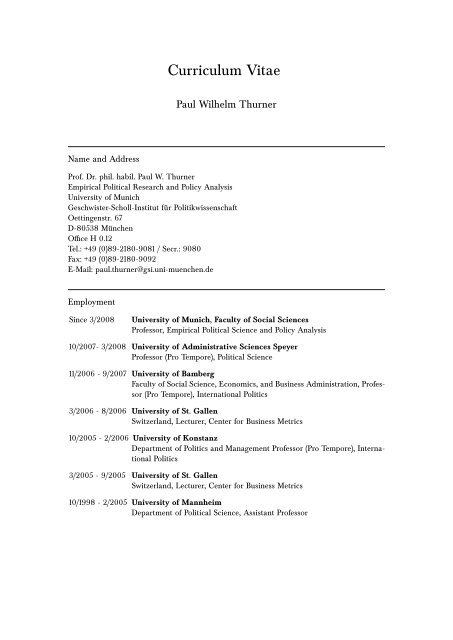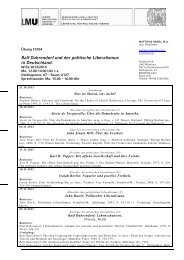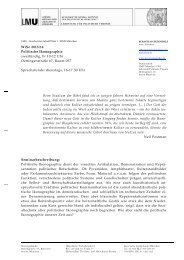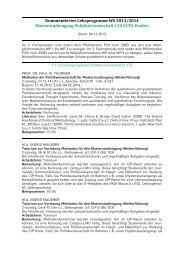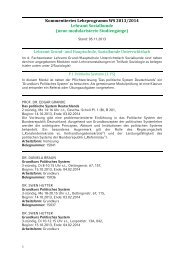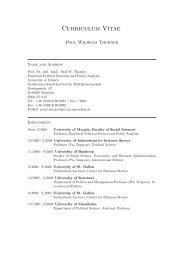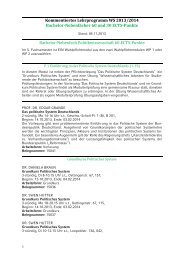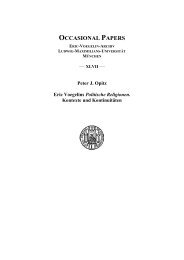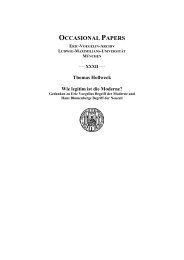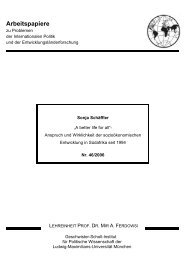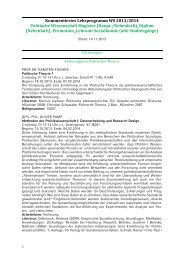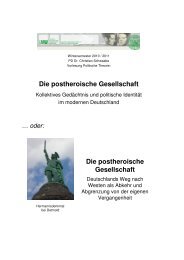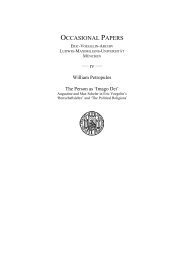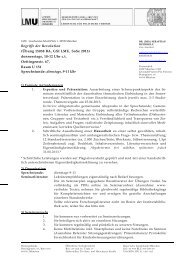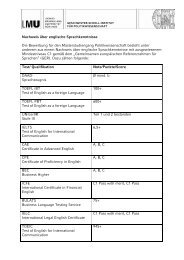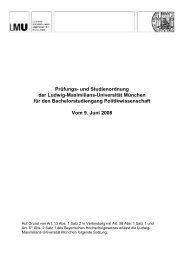english_cv - Geschwister-Scholl-Institut für Politikwissenschaft - LMU
english_cv - Geschwister-Scholl-Institut für Politikwissenschaft - LMU
english_cv - Geschwister-Scholl-Institut für Politikwissenschaft - LMU
Create successful ePaper yourself
Turn your PDF publications into a flip-book with our unique Google optimized e-Paper software.
Name and Address<br />
Curriculum Vitae<br />
Paul Wilhelm Thurner<br />
Prof. Dr. phil. habil. Paul W. Thurner<br />
Empirical Political Research and Policy Analysis<br />
University of Munich<br />
<strong>Geschwister</strong>-<strong>Scholl</strong>-<strong>Institut</strong> <strong>für</strong> <strong>Politikwissenschaft</strong><br />
Oettingenstr. 67<br />
D-80538 München<br />
Office H 0.12<br />
Tel.: +49 (0)89-2180-9081 / Secr.: 9080<br />
Fax: +49 (0)89-2180-9092<br />
E-Mail: paul.thurner@gsi.uni-muenchen.de<br />
Employment<br />
Since 3/2008 University of Munich, Faculty of Social Sciences<br />
Professor, Empirical Political Science and Policy Analysis<br />
10/2007- 3/2008 University of Administrative Sciences Speyer<br />
Professor (Pro Tempore), Political Science<br />
11/2006 - 9/2007 University of Bamberg<br />
Faculty of Social Science, Economics, and Business Administration, Professor<br />
(Pro Tempore), International Politics<br />
3/2006 - 8/2006 University of St. Gallen<br />
Switzerland, Lecturer, Center for Business Metrics<br />
10/2005 - 2/2006 University of Konstanz<br />
Department of Politics and Management Professor (Pro Tempore), International<br />
Politics<br />
3/2005 - 9/2005 University of St. Gallen<br />
Switzerland, Lecturer, Center for Business Metrics<br />
10/1998 - 2/2005 University of Mannheim<br />
Department of Political Science, Assistant Professor
4/2002 - 9/2002 Center for Interdisciplinary Research (ZiF) Bielefeld<br />
Research Group ‘Procedural Approaches to Conflict Resolution’ Research<br />
Fellow<br />
2003 - 2005 Mannheim Center for European Social Research<br />
Interdisciplinary Research Group ‘<strong>Institut</strong>ionalization of International Negotiation<br />
Systems’, Research Group Coordinator<br />
12/1996 - 6/1997 General Secretariat of the Council of the EU, Bruxelles<br />
In-Service training with DGF, (Preparation of the Research Project ‘International<br />
Negotiations and Interministerial Coordination: The IGC 1996’,<br />
granted by the German Research Foundation)<br />
4/1995 - 9/1998 Mannheim Center for European Social Research<br />
Senior Research Fellow<br />
Education<br />
12/2004 University of Mannheim<br />
Habilitation in Political Science<br />
3/1992 - 3/1995 University of Mannheim<br />
Doctoral Dissertation (Summa Cum Laude)<br />
7/1991 University of Passau<br />
M.A. Political Science, Sociology, History (Grade: 1)<br />
Grants<br />
• Research Project ‘German Public Opinon and EMU’. Granted by Thyssen Foundation,<br />
1998: e 28.000, principal coinvestigator, jointly with Franz Urban Pappi.<br />
• Research Project ‘National Interministerial Coordination and International Negotiations:<br />
The IGC 1996’. Granted by the German Research Foundation, 1999-2001, Interdisciplinary<br />
Research Group ‘<strong>Institut</strong>ionalization of International Negotiations’: e 88.695,<br />
principal coinvestigator, jointly with Franz Urban Pappi.<br />
• Research Project ‘European Health Policy and National Regulation of Pharmaceutical<br />
Markets’. Granted by the German Research Foundation, 2001-2003, Interdisciplinary<br />
Research Group ‘<strong>Institut</strong>ionalization of International Negotiations’: e 110.400, principal<br />
coinvestigator, jointly with Franz Urban Pappi.<br />
• Research Project ‘Comparative International Negotiation Systems’. Granted by the German<br />
Research Foundation, 2003-2005, Interdisciplinary Research Group ‘<strong>Institut</strong>ionalization<br />
of International Negotiations’: e 52.800, principal coinvestigator, jointly with<br />
Franz Urban Pappi.
• Flexibility Rules in International Environmental Treaties. Granted by the Center for European<br />
Social Research, 2002: e 3.500, principal coinvestigator, jointly with Bernhard<br />
Boockmann.<br />
• Simulation of Intra- and Intergovernmental Processes, 2003/2004. Granted by the Center<br />
for European Social Research, Mannheim: e 13.500, principal coinvestigator, with<br />
Nicole J. Saam, University of Munich.<br />
• Book Publication Project ‘European Union Intergovernmental Conferences: Domestic<br />
Preference Formation, Transgovernmental Networks, and the Dynamics of Compromise’.<br />
Granted by the Center for European Social Research, Mannheim, 2006/7: e 30.000.<br />
• Conference Grant ‘Advanced Political Network Modelling’. Granted by the German<br />
Research Foundation, 2007: e 15.280, co-organizer: John T. Scholz.<br />
• Conference and Book Publication Project ‘Comparative Policies and Politics of Nuclear<br />
Energy, principal coinvestigator, jointly with Wolfgang C. Müller. Granted by Thyssen-<br />
Foundation 2008: e 18.500.<br />
• Conference and Workshop Grant: Networks in Political Science.Granted by the US National<br />
Science Foundation. Participating Investigator with: Chris Ansell (UC Berkeley),<br />
James Fowler (UC San Diego), Michael Heaney (Florida), David Lazer (Harvard), John<br />
Padgett (Chicago), John T. Scholz (Florida State University) 2008-2009: $ 34.500.<br />
• Issue-Inkonsistency, Issue-Indifference and the Effectiveness of Framing: The Case of<br />
Nuclear Energy. Laboratory Expermients granted by the Munich Experimental Laboratory<br />
for Economic and Social Sciences (MELESSA) 2010: e 2000.<br />
• Conference Participation. Granted by the German Research Foundation: Annual Conference<br />
of the American Political Science Association 1998, 1999, 2000, 2007, Annual<br />
Conference of the Midwest Political Science Association 2006, 2007.<br />
Awards, Fellowships<br />
• Studienstiftung des Deutschen Volkes (M.A. study grant)<br />
• German Academic Exchange Service, <strong>Institut</strong> d’Etudes Politiques de Paris grant<br />
• German Research Foundation (Dissertation grant)<br />
• Center for Interdisciplinary Research (ZiF) Bielefeld, Research Group ‘Procedural Approaches<br />
to Conflict Resolution’ Research Fellow grant<br />
• London School of Economics and Political Science, Centre for International Studies<br />
Visiting Fellowship (2006/7, declined)
Publications<br />
<br />
• Thurner, Paul W. and Franz U. Pappi, 2009: European Union Intergovernmental Conferences:<br />
Domestic Preference Formation, Transgovernmental Networks, and the Dynamics<br />
of Compromise. New York/London: Routledge. (peer-reviewed; publication grant<br />
by the Mannheim Centre for European Social Research)<br />
• Thurner, Paul W., 2006: Die graduelle Konstitutionalisierung der Europäischen Union.<br />
Eine quantitative Fallstudie am Beispiel der Regierungs-konferenz 1996. Tübingen:<br />
Mohr Siebeck. (Die Einheit der Gesellschaftswissenschaften, Vol. 136). (peer-reviewed)<br />
• Thurner, Paul W., 1998: Wählen als rationale Entscheidung. Die Modellierung von Politikreaktionen<br />
im Mehrparteiensystem. München: Oldenbourg. (Scientia Nova). (peerreviewed;<br />
publication grant by the German Research Foundation)<br />
Edited Book<br />
• Pappi, Franz. U., Eibe Riedel, Paul W. Thurner, and Roland Vaubel (eds.), 2004: Die<br />
<strong>Institut</strong>ionalisierung Internationaler Verhandlungen. Frankfurt/New York: Campus.<br />
<br />
• Baccini, Leo, Veronica Lenzi, and Paul W. Thurner, 2013: Global Energy Governance:<br />
Trade, Infrastructure, and the Diffusion of International Organizations. International<br />
Interactions (in print)<br />
• Thurner, Paul W. and Martin Binder, 2012: Formal and Real Authority of Ministerial<br />
Jurisdictions in Semi-Open States. The Comparative Value of Inside and Outside<br />
Networking. Journal of European Public Policy 19, 6: 814-843.<br />
• Thurner, Paul W., Ingrid Mauerer, and Martin Binder, 2011: Parteienspezifisches Issue<br />
Voting bei den Bundestagswahlen 2002-2009. Politische Vierteljahresschrift 45 (Sonderheft):<br />
302-321, (Special Issue: Wählen in Deutschland, ed. Rüdiger Schmitt-Beck).<br />
• Shikano, Suzumu, Michael Herrmann, and Paul W. Thurner, 2009: Strategic Voting<br />
under Proportional Representation: Threshold Insurance in German Elections. West<br />
European Politics 32,3: 630-652.<br />
• Thurner, Paul W. and Martin Binder, 2009: EU Transgovernmental Networks: The<br />
Emergence of a New Political Space beyond the Nation State? European Journal of Political<br />
Research 48: 80-106.<br />
• Thurner, Paul W., 2008: Nichtförmliche Verwaltungskooperation der Ministerialbürokratien<br />
der EU-Mitgliedstaaten und netzwerkbasierte Zusammenstellung von nationalen<br />
und übernationalen Prozessteams. Politische Vierteljahresschrift 41: 401-429. (Special
Issue: Governance in einer sich wandelnden Welt, eds.: Schuppert, Gunnar Folke / Michael<br />
Zürn).<br />
• Thurner, Paul W. and Franz U. Pappi, 2006: Domestic and International Politics during<br />
EU Intergovernmental Conferences. Bridging the Gap between Negotiation Theory and<br />
Practice. Negotiation Journal 22,2: 167-185.<br />
• Boockmann, Bernhard and Paul W. Thurner, 2006: Flexibility Provisions in Multilateral<br />
Environmental Treaties. International Environmental Agreements. Politics, Law and<br />
Economics 6,2: 113-135.<br />
• Thurner, Paul W., Michael Stoiber, and Cornelia Weinmann, 2005: Informelle Transgouvernementale<br />
Koordinationsnetzwerke der Ministerialbürokratie der EU - Mitgliedstaaten<br />
bei einer Regierungskonferenz. Politische Vierteljahresschrift: 45,4: 552-574.<br />
• Thurner, Paul W. and Eric Linhart, 2004: Political Multilevel Negotiations and Issue<br />
Linkage during an EU Intergovernmental Conference: An Empirical Application. Computational<br />
and Mathematical Organization Theory, 9,3: 243-266.<br />
• Thurner, Paul W., Clemens Kroneberg, and Michael Stoiber, 2003: Strategisches Signalisieren<br />
bei internationalen Verhandlungen. Eine quantitative Analyse am Beispiel der<br />
Regierungskonferenz 1996. Zeitschrift <strong>für</strong> Internationale Beziehungen 10,2: 287-320.<br />
• Thurner, Paul W. and Michael Stoiber, 2002: Interministerielle Netzwerke: Formale und<br />
informelle Koordinationsstrukturen bei der Vorbereitung der deutschen Verhandlungspositionen<br />
zur Regierungskonferenz 1996. Politische Vierteljahresschrift 42, 4: 561-605.<br />
• Pappi, Franz U. and Paul W. Thurner, 2002: Electoral Behavior in a Two-Vote-System:<br />
Incentives for Ticket Splitting in German Bundestag Elections. European Journal of Political<br />
Research 41,2: 207-232.<br />
• Thurner, Paul W., 2000: The Empirical Application of the Spatial Theory of Voting in<br />
Multiparty Systems with Random Utility Models. Electoral Studies 19,4: 493-517.<br />
• Thurner, Paul W. and Angelika Eymann, 2000: Policy-Specific Alienation and Indifference<br />
in the Calculus of Voting: A Simultaneous Model of Party Choice and Abstention.<br />
Public Choice 102,1-2: 51-77.<br />
• Pappi, Franz U. and Paul W. Thurner, 2000: Die deutschen Wähler und der Euro:<br />
Auswirkungen auf die Bundestagswahl 1998 und längerfristige Perspektiven. Politische<br />
Vierteljahresschrift 41,3: 435-465.<br />
• Thurner, Paul W., 1999: Taktisch oder Aufrichtig? Zur Untersuchung des Stimmensplittings<br />
bei Bundestagswahlen. Eine Replik auf Harald Schoens Beitrag in Heft 2/1998 der<br />
Zeitschrift <strong>für</strong> Parlamentsfragen. Zeitschrift <strong>für</strong> Parlamentsfragen 30,1: 163-166.
• Schöning, Norbert, Paul W. Thurner, and Martin Binder, 2012: Indifferenz und Inkonsistenz<br />
als Moderatoren von räumlichen Framing-Effekten: Ein Laborexperiment am<br />
Beispiel der Kernenergie. In: Bräuninger, Thomas, Susumu Shikano, and André Bächtiger<br />
(eds.): Jahrbuch <strong>für</strong> Handlungs- und Entscheidungstheorie, Band 7. Wiesbaden, VS<br />
Verlag: (accepted for publication).<br />
• Thurner, Paul W., 2010: Political Network Analysis. In: Geoffrey Garrett, Margaret Levi,<br />
Paula D. McClain, James E. Alt, and Simone Chambers (eds.), 2010: Encyclopedia of<br />
Political Science. Washington: CQ Press.<br />
• Thurner, Paul W., 2010: ‘Issue-Unentschiedene’ und ‘Issue-Inkonsistente’ als Targetpopulationen?<br />
Das Beispiel Kernenergie (1987-2005). In: Thorsten Faas, Kai Arzheimer,<br />
and Sigrid Roßteutscher (eds.): Information-Wahrnehmung-Emotion: Politische Psychologie<br />
in der Wahl- und Einstellungsforschung. Wiesbaden: VS Verlag, 333-353.<br />
• Thurner, Paul W., 2010: Enhancing Horizontal and Vertical Self-Organization: Harnessing<br />
Informal Networks to Integrate Policies Within and Between Governments in the<br />
European Union. In: Rick Feiock and John T. Scholz (eds.): Self - organizing Federalism:<br />
Collaborative Mechanisms to Mitigate <strong>Institut</strong>ional Collective Action: Cambridge:<br />
Cambridge University Press, 261-284.<br />
• Thurner, Paul W., 2009: Die simultane Modellierung von Wahlbeteiligung und Wahlentscheidung.<br />
In: Henning, Christian, Eric Linhart, and Susumu Shikano (eds.): Parteienwettbewerb,<br />
Wählerverhalten und Koalitionsbildung. Wiesbaden: VS Verlag, 47-56.<br />
• Thurner, Paul W., 2009: Internationale Verhandlungen und Interministerielle Koordination.<br />
In: Schnapp, Kai-Uwe, et al. (eds.): Datenwelten. Datenerhebung und Datenbestände<br />
in der <strong>Politikwissenschaft</strong>. Nomos-Verlag: Baden-Baden, 259-270.<br />
• Thurner, Paul W., 2008: Verfahren der kollektiven Entscheidungsfindung. In: Gosepath,<br />
Stephan, Wilfried Hinsch, and Beate Rössler (eds.): Handbuch der politischen Philosophie<br />
und Sozialphilosophie Berlin, New York: Walter de Gruyter, 275-281.<br />
• Herrmann, Michael, Susumu Shikano, Paul W. Thurner, and Axel Becker, 2006: Die<br />
Analyse von Wählerpräferenzen mit Rank Ordered Logit. In: Bräuninger, Thomas and<br />
Joachim Behnke (eds.): Jahrbuch Handlungs- und Entscheidungstheorie, Band 4, 113-134.<br />
• Thurner, Paul W., 2006: Modelle diskreter Entscheidungen. In: Behnke, Joachim, Thomas<br />
Gschwend, Delia Schindler, and Kai-Uwe Schnapp (eds.): Empirische Methoden<br />
der <strong>Politikwissenschaft</strong>. Neuere qualitative und quantitative Analyseverfahren. Nomos:<br />
Baden-Baden, 193-204.<br />
• Thurner, Paul W. and Franz U. Pappi, 2005: Quantitative Negotiation Analysis: Insights<br />
from the Social Scientist’s Craft. Riedel, Eibe, Dirk Hanschel (eds.): <strong>Institut</strong>ionalization<br />
of International Negotiation Systems. Theoretical Concepts and Practical Insights (Conference<br />
Report). Mannheim: Mannheimer Zentrum <strong>für</strong> Europäische Sozialforschung.
• Saam, Nicole J., Paul W. Thurner and Frank Arndt, 2004. Dynamics of International<br />
Negotiations. A Simulation of EU Intergovernmental Conferences. In: van Dijkum, Cor,<br />
Jörg Blasius, Henk Kleijer, and Branko van Hilten (eds.). Recent Developments and<br />
Applications in Social Research Methodology. Proceedings of the Sixth International<br />
Conference on Logic and Methodology. August 17-20, 2004, Amsterdam, The Netherlands.<br />
• Thurner, Paul W., 2004: Determinanten transgouvernementaler Koordinationsbeziehungen<br />
der Ministerien der EU-Mitgliedsstaaten: Eine Überprüfung der Keohane/Nye-<br />
Conjecture. In: Henning, Christian H.C.A. and Christian Melbeck (eds.): Interdisziplinäre<br />
Sozialforschung. Theorie und empirische Anwendungen. Frankfurt/New York:<br />
Campus, 165-180.<br />
• Pappi, Franz U., Eibe Riedel, Paul W. Thurner, and Roland Vaubel, 2004: Die <strong>Institut</strong>ionalisierung<br />
Internationaler Verhandlungssysteme als Fragestellung einer interdisziplinären<br />
Forschergruppe. In: Pappi, Franz. U., Eibe Riedel, Paul W. Thurner, and Roland<br />
Vaubel (eds.): Die <strong>Institut</strong>ionalisierung Internationaler Verhandlungen. Frankfurt/New<br />
York: Campus, 11-32.<br />
• Stoiber, Michael and Paul W. Thurner, 2004: Die Ratifikation intergouvernementaler<br />
Verträge: Konstitutionelle Erfordernisse und akteursspezifische Agendakontrolle. In:<br />
Pappi, Franz U., Paul W. Thurner, Eibe Riedel, and Roland Vaubel (eds.): Die <strong>Institut</strong>ionalisierung<br />
Internationaler Verhandlungen. Frankfurt/New York: Campus, 173-204.<br />
• Linhart, Eric and Paul W. Thurner, 2004: Die Erklärungskraft spiel- und tauschtheoretischer<br />
Verhandlungsmodelle bei gegebenem <strong>Institut</strong>ionalisierungsgrad. Ein empirischer<br />
Vergleich am Beispiel des Endgames der Regierungskonferenz 1996. In: Pappi, Franz<br />
U., Eibe Riedel, Paul W. Thurner, and Roland Vaubel (eds.): Die <strong>Institut</strong>ionalisierung<br />
Internationaler Verhandlungen. Frankfurt/New York: Campus, 261-292.<br />
• Thurner, Paul. W., 2000: Agrarstruktur und der Aufstieg der NSDAP in Bayern. Die<br />
Rolle der Betriebsgrößenstruktur. In: Immerfall, Stefan (ed.): Parteien, Kulturen und<br />
Konflikte. Opladen: Westdeutscher Verlag, 83-110.<br />
• Thurner, Paul W. and Franz U. Pappi, 1998: ‘Retrospective’ und ‘Prospective Voting’ in<br />
Mehrparteiensystemen mit Koalitionsregierung. Die Bundestagswahl 1994. In: Kaase,<br />
Max and Hans-Dieter Klingemann (eds.): Wahlen und Wähler. Analysen aus Anlass der<br />
Bundestagswahl 1994. Opladen: Westdeutscher Verlag, 113-144.<br />
• Thurner, Paul W., 1997: Nationale öffentliche Meinungen und internationale Verhandlungssysteme.<br />
Die Regierungskonferenz 1996. In: Hrbek, Rudolf (ed.): Die Reform der<br />
Europäischen Union. Positionen und Perspektiven anläßlich der Regierungskonferenz.<br />
Baden-Baden: Nomos.
• Thurner, Paul W., 2008: Review of: Herwig C.H. Hofmann and Alexander H. Türk<br />
(eds.), 2006: EU Administrative Governance. Cheltenham: E. Elgar. European Journal of<br />
International Law 19,2: 455-456.<br />
• Thurner, Paul W., 2005: Review of: Thomas Bräuninger, 2002: Internationale <strong>Institut</strong>ionenpolitik:<br />
Die Wahl von Entscheidungsregeln <strong>für</strong> die Meeresbodenbehörde. Frankfurt/New<br />
York: Campus. Kölner Zeitschrift <strong>für</strong> Soziologie und Sozialpsychologie 57,2: 356-<br />
358.<br />
• Thurner, Paul W., 2000: Überhangmandate: theoretisch und empirisch unerschöpft. Review<br />
of: Holger Jakob, 1998: Überhangmandat und Gleichheit der Wahl. Ein Beitrag zur<br />
aktuellen Wahlrechtsdiskussion. Frankfurt: Peter Lang. Zeitschrift <strong>für</strong> Parlamentsfragen<br />
31,2: 493-494.<br />
<br />
• Thurner, Paul W., Ingrid Mauerer, and Marc Debus, 2012: Conditionality of Party-<br />
Specific Issue-Voting in German Election 1987-2009. A Conditional Logit Approach.<br />
(submitted)<br />
• Thurner, Paul W., André Klima, and Helmut Küchenhoff, 2012: Agricultural Structure<br />
and the Rise of the Nazi Party Reconsidered. (to be presented at the Annual Conference<br />
of the European Political Science Association, Berlin 2012) (submitted)<br />
• Thurner, Paul W., Marcel Kiel, Micha Schneider, 2011: Committee Networks in the<br />
European Parliament: Structure and Impact on Allocation of Reports. (presented at the<br />
Annual Conference of the European Political Science Association, Berlin 2012)<br />
• Thurner, Paul W. and Alexander Hatzold, 2010: Global Energy Governance - a Network<br />
Perspective. Ms. <strong>LMU</strong> Munich. (Presented at the Conference on Political Network<br />
Analysis, Duke University ( June 2010), and to ASNA Zurich (September 2010))<br />
• Thurner, Paul W. and Martin Binder, 2010: Issue-Voting bei der Bundestagswahl 2009.<br />
Ms. <strong>LMU</strong> Munich. (Presented at the German Longitudinal Election Study conference<br />
on the 2009 German Election, Mannheim (September 2010))<br />
• Thurner, Paul W., 2010: Country Chapter ‘Germany’. In: Müller, Wolfgang C. and Paul<br />
W. Thurner (eds.): Politics of Nuclear Energy in Europe (in preparation). Ms. <strong>LMU</strong><br />
Munich.<br />
• Thurner, Paul W. and Martin Binder, 2008: Formal and Real Authority of Ministerial<br />
Jurisdictions in Semi-Open States. The Comparative Value of Inside and Outside Networking<br />
(Ms., presented at the Harvard Conference on Networks in Political Science,<br />
Boston, June 2008)
• Thurner, Paul W. and Martin Binder, 2007: Multiplex Interorganizational Networks of<br />
State Officials: A Random Effects p2-Model. (Ms., presented at the Annual Conference<br />
2007 of the American Political Science Association, Chicago).<br />
• Thurner, Paul W. and Martin Binder, 2007: Effectiveness of Ministries’ Claims in EU<br />
Intergovernmental Negotiations: A Multi-Level Approach. (Ms., presented at der Annual<br />
Conference 2007 of the Midwest Political Science Association, Chicago).<br />
• Thurner, Paul W. and Martin Binder, 2006: Explaining Transgovernmental Network<br />
Choices with Exponential Random Graph Models. (presented at Annual Conference<br />
2006 of the Midwest Political Science Association, Chicago).<br />
• Shikano, Suzumu, Paul W. Thurner, and Michael Herrmann, 2006: Explaining (in)complete<br />
preference rankings versus explaining stated party choice: The role of expectations.<br />
(presented at Annual Conference 2006 of the Midwest Political Science Association,<br />
Chicago).<br />
• Saam, Nicole J., Paul W. Thurner, and Frank Arndt, 2004: Dynamics of International<br />
Negotiations. A Simulation of EU Intergovernmental Conferences. Arbeitspapiere -<br />
Mannheimer Zentrum <strong>für</strong> Europäische Sozialforschung / Nr. 78. Mannheim 2004.<br />
• Thurner, Paul W. and Eric Linhart, 2004: Domestic Politics and EU Intergovernmental<br />
Conferences. A Theoretical Conceptualization and Empirical Testing of the Putnam<br />
Conjectures. Arbeitspapiere - Mannheimer Zentrum <strong>für</strong> Europäische Sozialforschung /<br />
Nr 77. Mannheim.<br />
• Thurner, Paul W., Clemens Kroneberg, and Michael Stoiber, 2003: Strategisches Signalisieren<br />
bei internationalen Verhandlungen. Eine empirisch-quantitative Analyse am<br />
Beispiel der Regierungskonferenz 1996. Arbeitspapiere - Mannheimer Zentrum <strong>für</strong> Europäische<br />
Sozialforschung / Nr. 70. Mannheim.<br />
• Thurner, Paul W., Franz U. Pappi, and Michael Stoiber, 2002: EU Intergovernmental<br />
Conferences: A Quantitative Analytical Reconstruction and Data-Handbook of Domestic<br />
Preference Formation, Transnational Networks and Dynamics of Compromise<br />
during the Amsterdam Treaty Negotiations. Arbeitspapiere Mannheimer Zentrum <strong>für</strong><br />
Europäische Sozialforschung Nr. 60 /IINS Research Paper No. 15. (294 pages).<br />
• Boockmann, Bernhard, and Paul W. Thurner: Flexibility Provisions in Multilateral Environmental<br />
Treaties. ZEW Discussion Paper / Nr. 02-44. Mannheim: 2002. [IINS Research<br />
Paper No. 13].<br />
• Thurner, Paul W. and Michael Stoiber, 2001: Interministerielle Netzwerke: Formale und<br />
informelle Koordinationsstrukturen bei der Vorbereitung der deutschen Verhandlungspositionen<br />
zur Regierungskonferenz 1996. Arbeitspapiere Mannheimer Zentrum <strong>für</strong><br />
Europäische Sozialforschung Nr. 37, Mannheim.
• Thurner, Paul W. and Peter Kotzian, 2001: Comparing European Health Care Systems<br />
from an <strong>Institut</strong>ional Economics Perspective. Paper delivered to the ECPR Joint Sessions<br />
2001, Grenoble.<br />
• Thurner, Paul W., Angelika Eymann, and Franz U. Pappi, 2000: Voter Reactions Towards<br />
EMU: Did Foreign Trade Sensitivity Matter? Paper presented at the 2000 Annual<br />
Meeting of the APSA, Washington.<br />
• Stoiber, Michael and Paul W. Thurner, 2000: Der Vergleich von Ratifikationsstrukturen<br />
der EU-Mitgliedsländer <strong>für</strong> Intergouvernementale Verträge: Eine Anwendung des<br />
Veto-Spieler-Konzeptes. Arbeitspapiere der DFG-Forschergruppe ‘<strong>Institut</strong>ionalisierung<br />
Internationaler Verhandlungssysteme’ Nr. 6.<br />
• Thurner, Paul W. and Franz U. Pappi, 1999: Causes and Effects of Coalition Preferences<br />
in a Mixed-Member Proportional System. Mannheim: MZES, Working Paper Nr. 1. (Paper<br />
(coauthored by André Kaiser) presented at the 1999 Annual Meeting of the APSA,<br />
Atlanta, September, 1999).<br />
• Thurner, Paul W. and Franz U. Pappi, 1998: Measuring and Explaining Strategic Voting<br />
in the German Electoral System. Mannheim: MZES, AB II, Working Paper Nr. 21. (Paper<br />
presented at the 1998 Annual Meeting of the APSA, Boston, September 1998).<br />
• Thurner, Paul W. and Angelika Eymann, 1997: Policy-Specific Alienation and Indifference<br />
in the Calculus of Voting: A Simultaneous Model of Party Choice and Abstention.<br />
Mannheim: MZES, AB II, Working Paper Nr. 18. ISSN 0948-0080.<br />
• Thurner, Paul W., 1996: Estimating the Parameters of a Spatial Voting Model with<br />
Multiattributive Random Utility Models. Mannheim: MZES, AB II, Working Paper Nr.<br />
13. ISSN: 0948-0080).<br />
• Immerfall, Stefan and Paul W. Thurner, 1996: Die REPs in Bayern. Der kurze Traum<br />
einer rechtspopulistischen Partei. S. 48-102 in: Immerfall, Stefan, Aline M. Kuntz, Alf<br />
Mintzel, and Paul W. Thurner (eds.): Parteien in Bayern. Passauer Papiere zur Sozialwissenschaft<br />
15. Passau.<br />
Knowledge Transfer / External Workshops<br />
<br />
8/2012 ECPR Summer School on Techniques and Methods, Ljubljana (two-week)<br />
8/2011 ECPR Summer School on Techniques and Methods, Ljubljana (two-week)<br />
8/2010 ECPR Summer School on Techniques and Methods, Ljubljana (two-week)<br />
8/2009 APSA 2009 Short Course, Toronto (one-day)<br />
8/2009 ECPR Summer School on Techniques and Methods, Ljubljana (one- week)
4/2009 Masters’ Spring Academy on Policy Analysis/German Policy Studies Conferences,<br />
Braunschweig<br />
3/2009 Berufsverband Deutscher Markt- und Sozialforscher e.V. (BVM) (two-day)<br />
6/2008 Harvard Conference on Networks in Political Science: Applying Network<br />
Methodology to Policy Analysis.<br />
4/2008 Association of German Market and Social Researchers (BVM) (two-day)<br />
8/2007 APSA 2007 Short Course, Chicago (one-day)<br />
5/2007 Centre for European Economic Research (ZEW), Mannheim (two-day)<br />
<br />
<br />
2/2013 ECPR Winter School on Methods and Techniques, Vienna (one-week)<br />
11/2008 Association of German Market and Social Researchers (BVM) (two-day)<br />
11/2007 Association of German Market and Social Researchers (BVM) (two-day,<br />
jointly with Florian Heiss, University of Munich, Dept. for Empirical Economics)<br />
3/2007 Centre for European Economics (ZEW), Mannheim (two-day, together with<br />
Florian Heiss, University of Munich)<br />
11/2006 Association of German Market and Social Researchers (BVM) (two-day,<br />
jointly with Florian Heiss, University of Munich, Dept. for Empirical Economics)<br />
9/2006 Ing-DiBa AG (two-day inhouse workshop)<br />
11/2005 Association of German Market and Social Researchers (BVM) (two-day,<br />
jointly with Florian Heiss, University of Munich, Dept. for Empirical Economics)<br />
03/2005 Centre for European Economics (ZEW) (three-day, jointly with Florian<br />
Heiss (Mannheim <strong>Institut</strong> of the Economics of Aging) and Andreas Ziegler<br />
(ZEW)<br />
10/2004 Association of German Market and Social Researchers (BVM) (two-day,<br />
jointly with Florian Heiss)<br />
11/2003 Association of German Market and Social Researchers (BVM) (two-day,<br />
jointly with Florian Heiss)<br />
09/2003 Centre for Survey Research and Methodology (ZUMA), (two-day, jointly<br />
with Florian Heiss)
09/2002 Association of German Market and Social Researchers (BVM) (two-day,<br />
jointly with Florian Heiss, cancelled due to too few attendants)<br />
11/2001 Centre for Survey Research and Methodology (ZUMA), (two-day, jointly<br />
with Florian Heiss)<br />
10/2001 Association of German Market and Social Researchers (BVM) (one-day)<br />
11/1999 DaimlerChrysler AG Berlin (two-day, jointly with Angelika Eymann)<br />
6/1996 Centre for Survey Research and Methodology (ZUMA), (two-day, jointly<br />
with Angelika Eymann)


